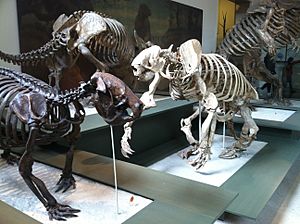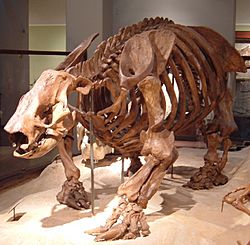Ground sloth facts for kids
Quick facts for kids Ground sloths |
|
|---|---|
 |
|
| AMNH mounts of (from left) Megalocnus rodens, Scelidotherium cuvieri, Megalonyx wheatleyi, Glossotherium robustus | |
| Scientific classification | |
| Kingdom: | |
| Phylum: | |
| Class: | |
| Superorder: | |
| Order: | |
| Suborder: |
Folivora (partim)
|
| Families | |
|
|
Ground sloths were huge, ancient relatives of the sloths we see today. They are now extinct, meaning they no longer live on Earth. These large sloths belonged to a group of mammals called Xenarthra. The much smaller sloths that live in trees today are called "tree sloths."
The very last ground sloths lived on islands in the Caribbean Sea. One type, called Megalocnus, might have lived on the island of Cuba until about 2,300 years ago. But on the mainlands of North America and South America, ground sloths had disappeared much earlier, over 10,000 years ago.
They survived longer on Caribbean islands because humans arrived there much later. Some island sloth populations lived 5,000 to 6,000 years longer than their relatives on the mainlands. This pattern suggests that these large animals likely became extinct because of humans. They were probably hunted or affected in other ways by people, which made it hard for them to survive.
Contents
How Ground Sloths Developed
Most of the ground sloth evolution happened in South America a very long time ago, during a period called the Tertiary. At that time, South America was separated from other continents. When the first ground sloths appeared in the fossil record, they were already quite unique.
Later, during the Miocene epoch, there were islands between the American continents. This allowed some ground sloths to travel and reach North America.
Ground Sloths Travel Far
Ground sloths were very tough animals. Their large numbers and ability to spread into faraway places show how strong they were. Their remains have even been found in parts of Alaska, which is very far north!
Sloths, and the larger group called xenarthrans, were one of the most successful animal groups from South America during a time called the Great American Interchange. This was when animals moved between North and South America after the continents connected. Many more animals moved from North America to South America than the other way around. However, at least five different types of ground sloths have been found as fossils in North America. This shows they were successful at migrating north.
Famous Ground Sloths
Some well-known types of ground sloths include:
- Megatherium: This was one of the largest land mammals ever, as big as an elephant!
- Paramylodon: This type of ground sloth was also very large and had strong claws.
Images for kids
-
Fossil Eremotherium skeleton, National Museum of Natural History, Washington, DC.
-
A Tamandua anteater in an upright defensive stance, similar to how ground sloths might have stood.
-
Subfossilized Nothrotheriops shastensis dung in Rampart Cave, Arizona (NPS, 1938).
See also
 In Spanish: Perezoso terrestre para niños
In Spanish: Perezoso terrestre para niños





